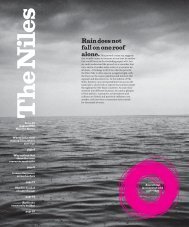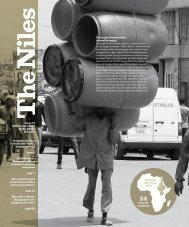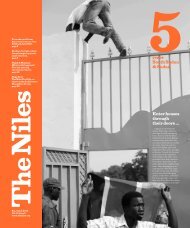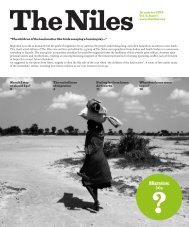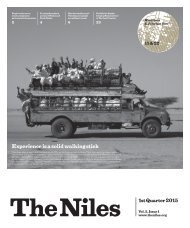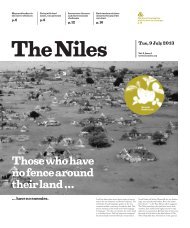When deeds speak, words are nothing
Speaking about sustainable development is easy. Acting sustainably is another matter. And now the evidence is unequivocal: Mankind’s impact on nature is causing the climate to change rapidly and drastically, threatening the environment and the very resources we need to survive. Aware that humanity is careening close to the edge, The Niles correspondents set out to explore where and how people in the Nile Basin region rethink. So much of their findings for now: We are an endlessly innovative species. Cooperation is our superpower. When deeds speak, words are nothing.
Speaking about sustainable development is easy. Acting sustainably is another matter. And now the evidence is unequivocal: Mankind’s impact on nature is causing the climate to change rapidly and drastically, threatening the environment and the very resources we need to survive. Aware that humanity is careening close to the edge, The Niles correspondents set out to explore where and how people in the Nile Basin region rethink. So much of their findings for now: We are an endlessly innovative species. Cooperation is our superpower. When deeds speak, words are nothing.
Create successful ePaper yourself
Turn your PDF publications into a flip-book with our unique Google optimized e-Paper software.
re<think
policies
& the way
we invest
8
E
Green investments to battle
climate change
The vital ecosystem of the Nile Basin
is already in the firm grip of climate
change. Can green investments throw
a lifeline to the region?
thiopia, Egypt and Sudan are caught in an
enormous geopolitical cold war over the usage
of the Blue Nile and the operation of the Grand
Ethiopian Renaissance Dam (GERD). The
United Nations Security Council (UNSC) has
convened, with others criticising and commenting
upon the mounting tension. Meanwhile,
the greatest threat in the Nile Basin, climate
change, is being ignored.
The world’s climate is already, on average,
one degree Celsius warmer than in preindustrial
times due to rising global greenhouse gas
concentrations. The Intergovernmental Panel
on Climate Change (IPCC) predicts that increases
in global mean temperature by one to three
degrees Celsius above 1990 levels will benefit
some regions and harm others.
The Nile Basin, Africa’s most significant
ecosystem, since it hosts over 40 percent of
Africa’s population (about 490 million people),
is already in the firm grip of climate change.
According to United Nations Environment
Programme (UNEP), the challenges emanating
from climate change in the Nile Basin include
uncertainty regarding precipitation and
river flow, land degradation, reduced river flow,
flooding, droughts, deforestation, and loss of
species and ecosystems and increased incidences
of disease.
Massive infrastructure damages, loss of
human lives, and Internally Displaced Peoples
(IDPs) have been observed, especially in the
last three years due to torrential rains that led
to flooding amid intense GERD debates.
Just last August 2020, Sudan suffered from
massive flooding that displaced more than
600.000 people, collapsed several houses and
damaged agricultural lands and infrastructures,
according to the United Nations Office for the
Coordination of Humanitarian Affairs (OCHA).
If the GERD reservoir had not held 4.5 million
cubic metres of water in that rainy season, the
damages would have been even worse.
Rethinking investments in agriculture
According to the Global Investment Bank
of Credit Suisse, investing with climate change
and a low-carbon economy in mind is part
of managing the material risk to the company’s
portfolio. Investors who acquire lands and seek
to decarbonise their portfolio may likely find
low-carbon investments in the Nile Basins’
new energy and agro-processing industries,
even though some citizens oppose the Gulf
investors’ growing interest in grabbing the
Nile Basin’s agricultural wetlands.
Even though climate change further exacerbates
the water stress, already up to 10.3 million
hectares of land have been acquired by investors
across the 11 Nile Basin countries since
2000. According to the Pulitzer Centre, most
of these lands were allocated in 28 transnational
deals. Companies from mainly Middle Eastern
states acquired vast land areas to produce food
crops, animal feed such as alfalfa and biofuels.
The water chain of food production and
climate change impacts need a rethink: Water
experts have been suggesting that a coordinated
water management system should be in place
to address water risks or stress.
The biggest challenge is at the private-sector
level. Most players believe that the water crisis
is the governments’ responsibility.
Interestingly, within the six years since
the launch of the United Nations Sustainable
Development Goals (SDGs), some global
savvy and responsible investors have started
to measure their operations and output with
these objectives to demonstrate how their investments
can better align with the UN’s framework.
So, there are likely to be signs of such
commitments from investors in the Nile Basin
and mechanisms for the management and
monitoring from the state actors.
Although developed nations are historically
responsible for the changing climate and
thus have an obligation to finance climate
adaptation projects in developing countries,
the debate around the Common But Differentiated
Responsibilities (CBDR), formalised
in the United Nations Framework Convention
on Climate Change of Earth Summit
in Rio de Janeiro, 1992, has not yet been resolved.
So the Nile Basin nations must generate
finances from private and public sectors by
implementing ecosystem services to adapt
to climate effects and ensure a sustainable flow
of Nile waters.
In consideration of developing models of
how ecosystems produce services at the scale
necessary to examine regional, national, and
global outcomes and the quantitative benefits
of the ecosystem and habitat restoration, the
Nile Basin Initiative (NBI) and the Regional
“Including
ecosystem services
can improve
how decisions
are made.”
Wetlands Expert Working Group have developed
a wetland atlas with the support of
the Deutsche Gesellschaft für Internationale
Zusammenarbeit (GIZ).
The management plans have been developed
for three transboundary wetland landscapes
Sio-Siteko (Kenya - Uganda), Semliki
(Uganda - DR Congo) and Sango/Minziro
Forest (Uganda - Tanzania), which the member
countries adopted in 2020. However, Lake
Tana wetland, registered by UNESCO as World
Biosphere Reserve, and the Blue Nile’s source
is missing.
According to National Ecosystem Services
Partnership (NESP), an initiative at Duke
University’s Nicholas Institute for Environmental
Policy Solutions, including ecosystem
services in decision making, can improve
how decisions are made and communicated
to the public. Failure to include ecosystem
services in decision making can shrink the
benefits ecosystems provide.
Climate change investments in agriculture
and implementing ecosystem services contribute
directly to several of the SDGs: 2 (zero
hunger); 12 (responsible consumption and
production); 13 (climate action); and potentially
15 (life on land) – as the Nile riparian states
will need less land for agriculture if they can
establish a mechanism to administer investors
jointly under a river basin organisation.
Installing a proper water management
system within the supply chains of listed
agricultural companies in the basin is key
to achieving water and food security.









